Effectiveness and Accountability of NGOs: An Exploratory Study in UAE
VerifiedAdded on 2021/06/17
|17
|3527
|35
Report
AI Summary
This report investigates the effectiveness and accountability of Non-Governmental Organizations (NGOs) in the United Arab Emirates (UAE). It explores the crucial role of NGOs in the nation's development, emphasizing the importance of accountability to stakeholders. The study examines research questions related to NGO effectiveness, accountability in addressing social issues, and their contribution to UAE development. The literature review covers internal controls, corruption costs, and the role of the accounting profession in combating corruption. The methodology involves a quantitative research design using questionnaires, with data analysis employing MS Excel, regression, and correlation analysis. The research aims to ensure data reliability and validity through updated website sources and Pearson correlation tests. The sampling method involves simple random sampling of 31 managers from UAE NGOs. The findings will be presented in tables and graphs to evaluate human responses. The report highlights the challenges NGOs face, including cultural differences in defining corruption and the need for robust internal control structures to prevent fraud. The research also considers the influence of external factors on internal control systems and the impact of corruption on development programs.
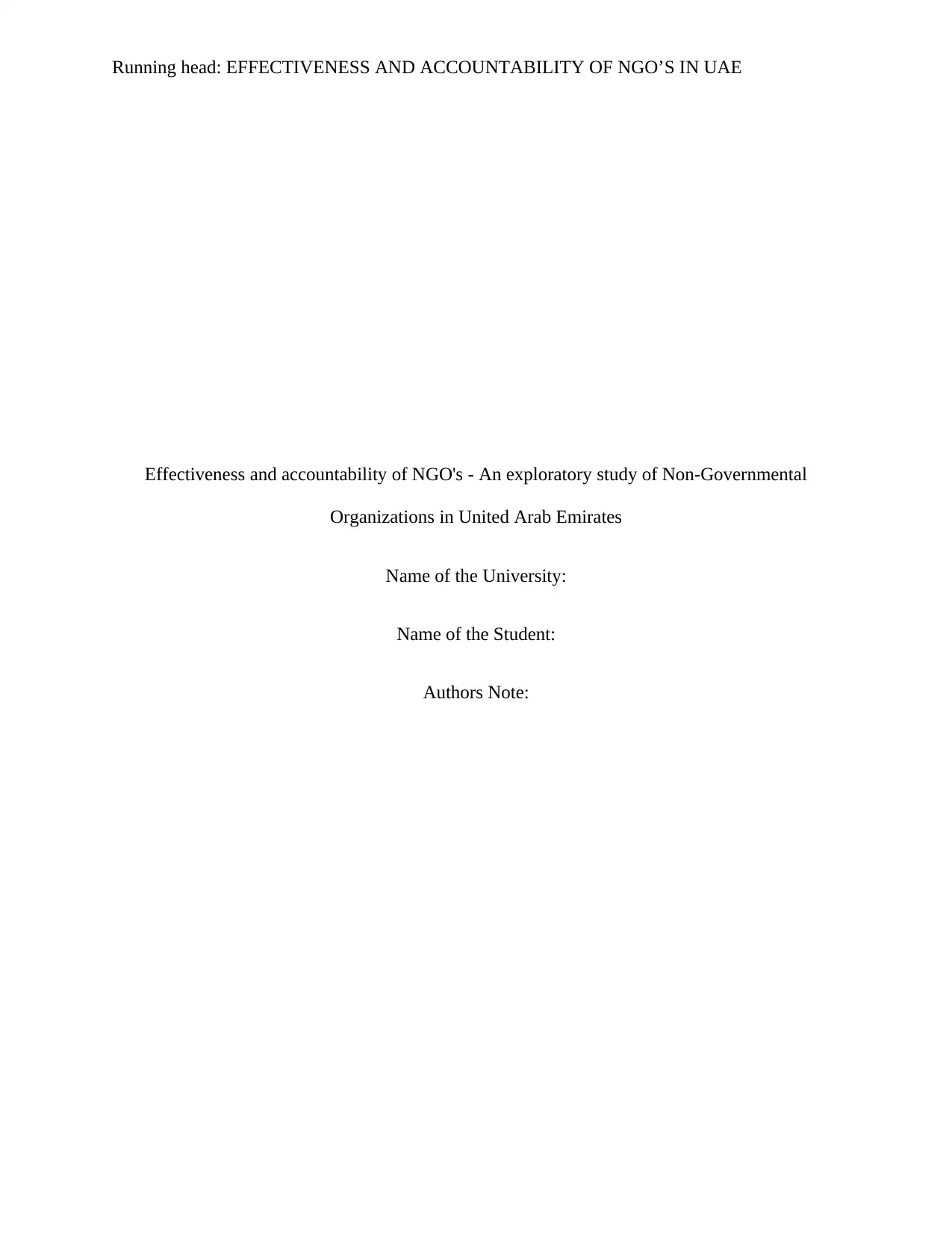
Running head: EFFECTIVENESS AND ACCOUNTABILITY OF NGO’S IN UAE
Effectiveness and accountability of NGO's - An exploratory study of Non-Governmental
Organizations in United Arab Emirates
Name of the University:
Name of the Student:
Authors Note:
Effectiveness and accountability of NGO's - An exploratory study of Non-Governmental
Organizations in United Arab Emirates
Name of the University:
Name of the Student:
Authors Note:
Paraphrase This Document
Need a fresh take? Get an instant paraphrase of this document with our AI Paraphraser
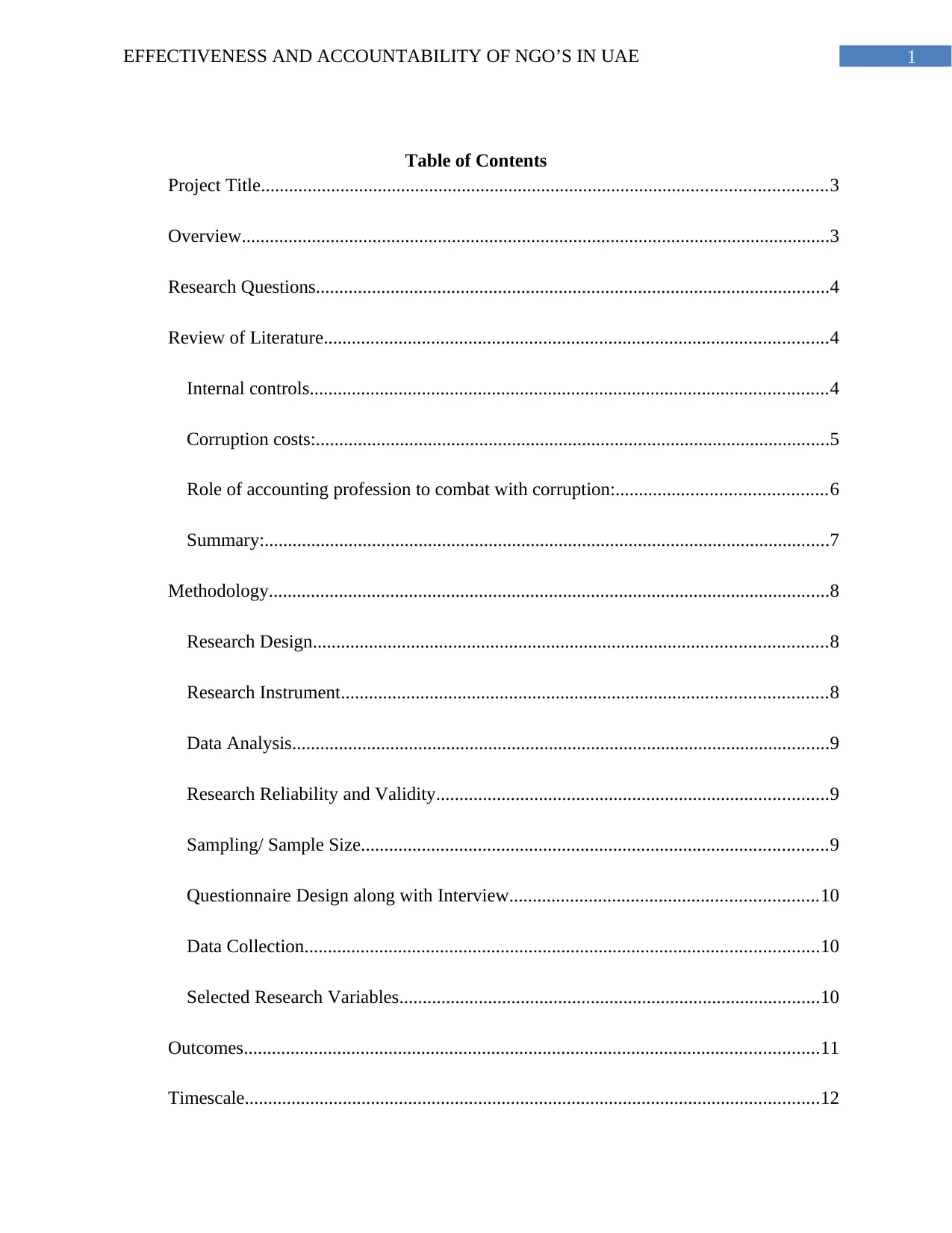
1EFFECTIVENESS AND ACCOUNTABILITY OF NGO’S IN UAE
Table of Contents
Project Title.........................................................................................................................3
Overview..............................................................................................................................3
Research Questions..............................................................................................................4
Review of Literature............................................................................................................4
Internal controls...............................................................................................................4
Corruption costs:..............................................................................................................5
Role of accounting profession to combat with corruption:.............................................6
Summary:.........................................................................................................................7
Methodology........................................................................................................................8
Research Design..............................................................................................................8
Research Instrument........................................................................................................8
Data Analysis...................................................................................................................9
Research Reliability and Validity....................................................................................9
Sampling/ Sample Size....................................................................................................9
Questionnaire Design along with Interview..................................................................10
Data Collection..............................................................................................................10
Selected Research Variables..........................................................................................10
Outcomes...........................................................................................................................11
Timescale...........................................................................................................................12
Table of Contents
Project Title.........................................................................................................................3
Overview..............................................................................................................................3
Research Questions..............................................................................................................4
Review of Literature............................................................................................................4
Internal controls...............................................................................................................4
Corruption costs:..............................................................................................................5
Role of accounting profession to combat with corruption:.............................................6
Summary:.........................................................................................................................7
Methodology........................................................................................................................8
Research Design..............................................................................................................8
Research Instrument........................................................................................................8
Data Analysis...................................................................................................................9
Research Reliability and Validity....................................................................................9
Sampling/ Sample Size....................................................................................................9
Questionnaire Design along with Interview..................................................................10
Data Collection..............................................................................................................10
Selected Research Variables..........................................................................................10
Outcomes...........................................................................................................................11
Timescale...........................................................................................................................12
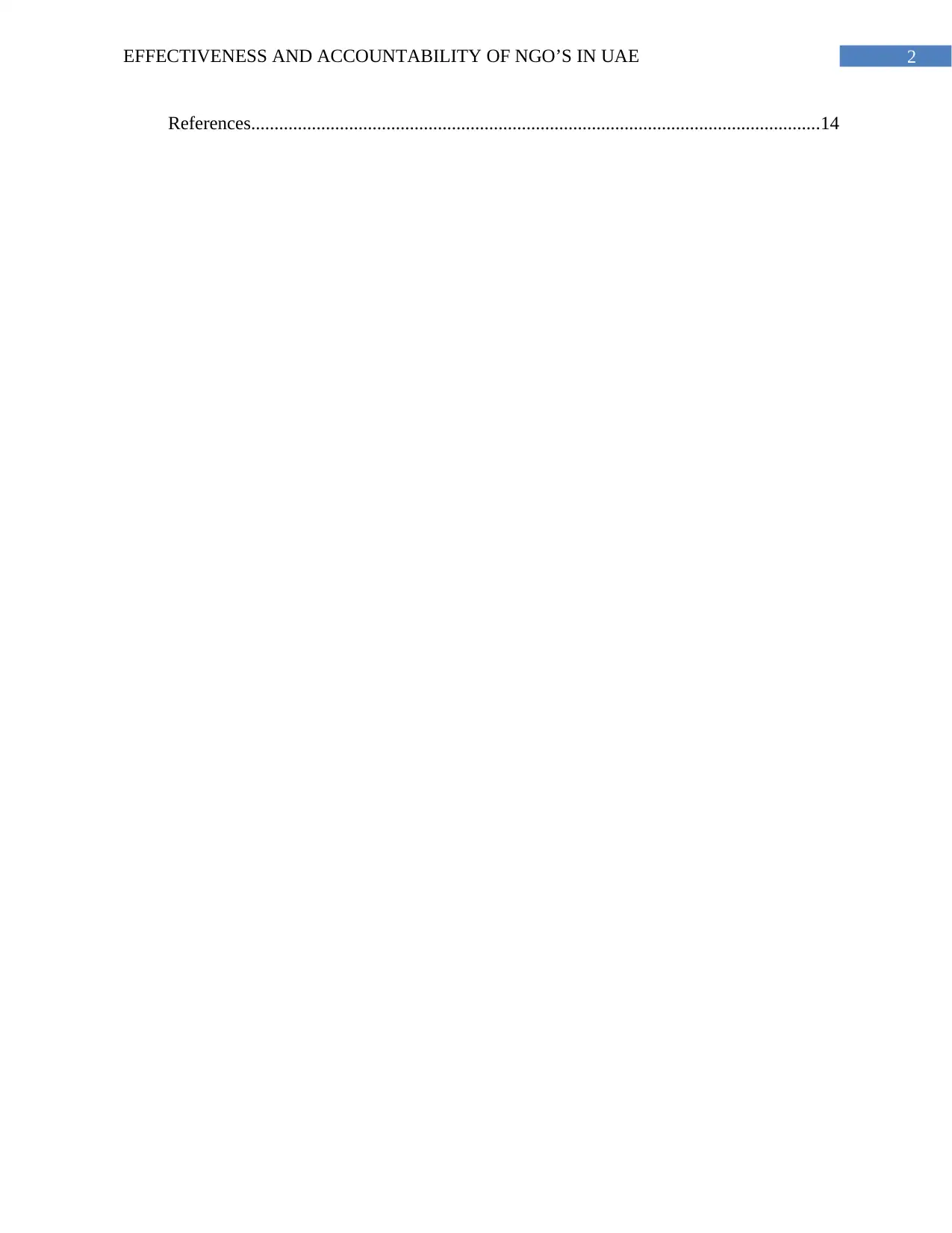
2EFFECTIVENESS AND ACCOUNTABILITY OF NGO’S IN UAE
References..........................................................................................................................14
References..........................................................................................................................14
⊘ This is a preview!⊘
Do you want full access?
Subscribe today to unlock all pages.

Trusted by 1+ million students worldwide
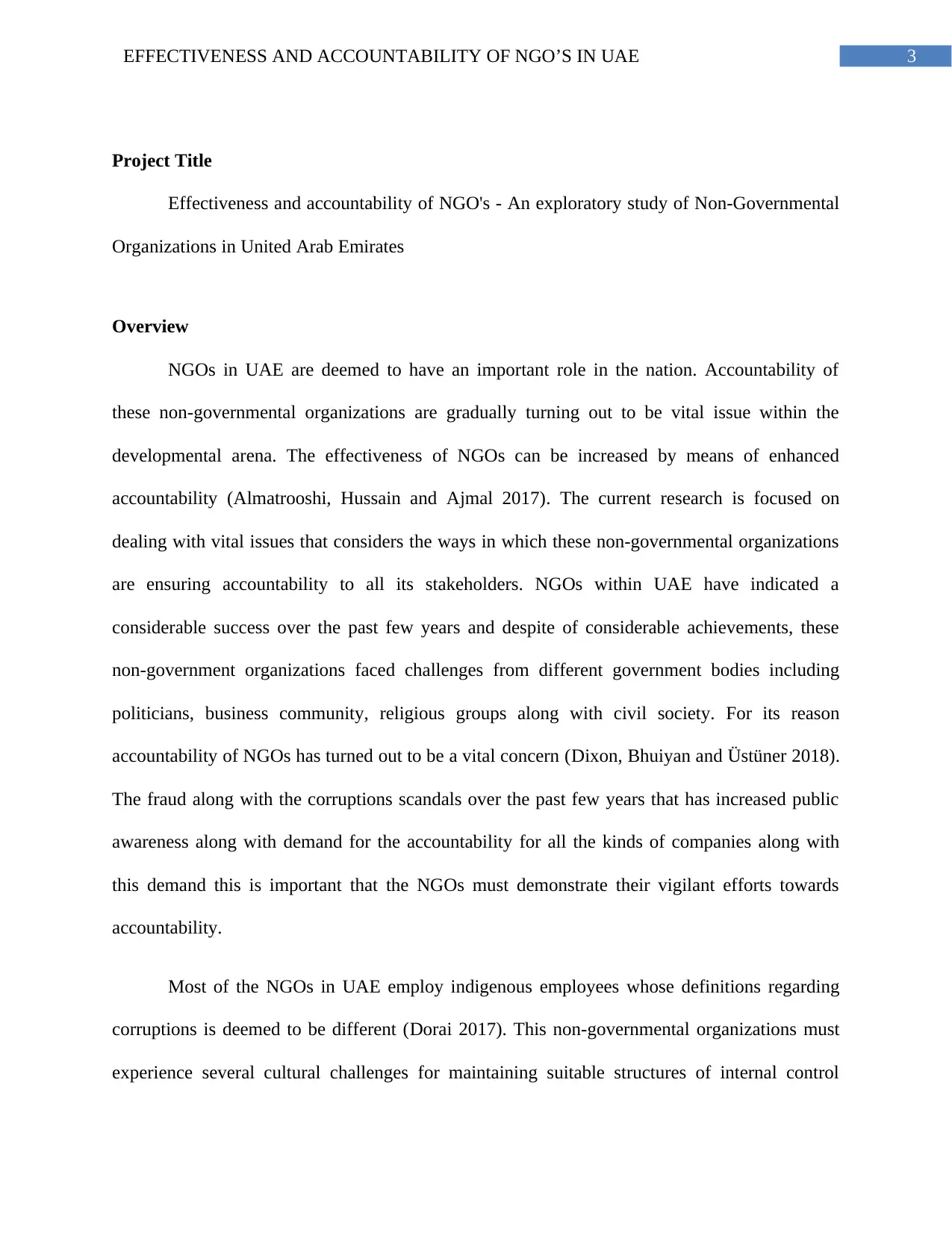
3EFFECTIVENESS AND ACCOUNTABILITY OF NGO’S IN UAE
Project Title
Effectiveness and accountability of NGO's - An exploratory study of Non-Governmental
Organizations in United Arab Emirates
Overview
NGOs in UAE are deemed to have an important role in the nation. Accountability of
these non-governmental organizations are gradually turning out to be vital issue within the
developmental arena. The effectiveness of NGOs can be increased by means of enhanced
accountability (Almatrooshi, Hussain and Ajmal 2017). The current research is focused on
dealing with vital issues that considers the ways in which these non-governmental organizations
are ensuring accountability to all its stakeholders. NGOs within UAE have indicated a
considerable success over the past few years and despite of considerable achievements, these
non-government organizations faced challenges from different government bodies including
politicians, business community, religious groups along with civil society. For its reason
accountability of NGOs has turned out to be a vital concern (Dixon, Bhuiyan and Üstüner 2018).
The fraud along with the corruptions scandals over the past few years that has increased public
awareness along with demand for the accountability for all the kinds of companies along with
this demand this is important that the NGOs must demonstrate their vigilant efforts towards
accountability.
Most of the NGOs in UAE employ indigenous employees whose definitions regarding
corruptions is deemed to be different (Dorai 2017). This non-governmental organizations must
experience several cultural challenges for maintaining suitable structures of internal control
Project Title
Effectiveness and accountability of NGO's - An exploratory study of Non-Governmental
Organizations in United Arab Emirates
Overview
NGOs in UAE are deemed to have an important role in the nation. Accountability of
these non-governmental organizations are gradually turning out to be vital issue within the
developmental arena. The effectiveness of NGOs can be increased by means of enhanced
accountability (Almatrooshi, Hussain and Ajmal 2017). The current research is focused on
dealing with vital issues that considers the ways in which these non-governmental organizations
are ensuring accountability to all its stakeholders. NGOs within UAE have indicated a
considerable success over the past few years and despite of considerable achievements, these
non-government organizations faced challenges from different government bodies including
politicians, business community, religious groups along with civil society. For its reason
accountability of NGOs has turned out to be a vital concern (Dixon, Bhuiyan and Üstüner 2018).
The fraud along with the corruptions scandals over the past few years that has increased public
awareness along with demand for the accountability for all the kinds of companies along with
this demand this is important that the NGOs must demonstrate their vigilant efforts towards
accountability.
Most of the NGOs in UAE employ indigenous employees whose definitions regarding
corruptions is deemed to be different (Dorai 2017). This non-governmental organizations must
experience several cultural challenges for maintaining suitable structures of internal control
Paraphrase This Document
Need a fresh take? Get an instant paraphrase of this document with our AI Paraphraser
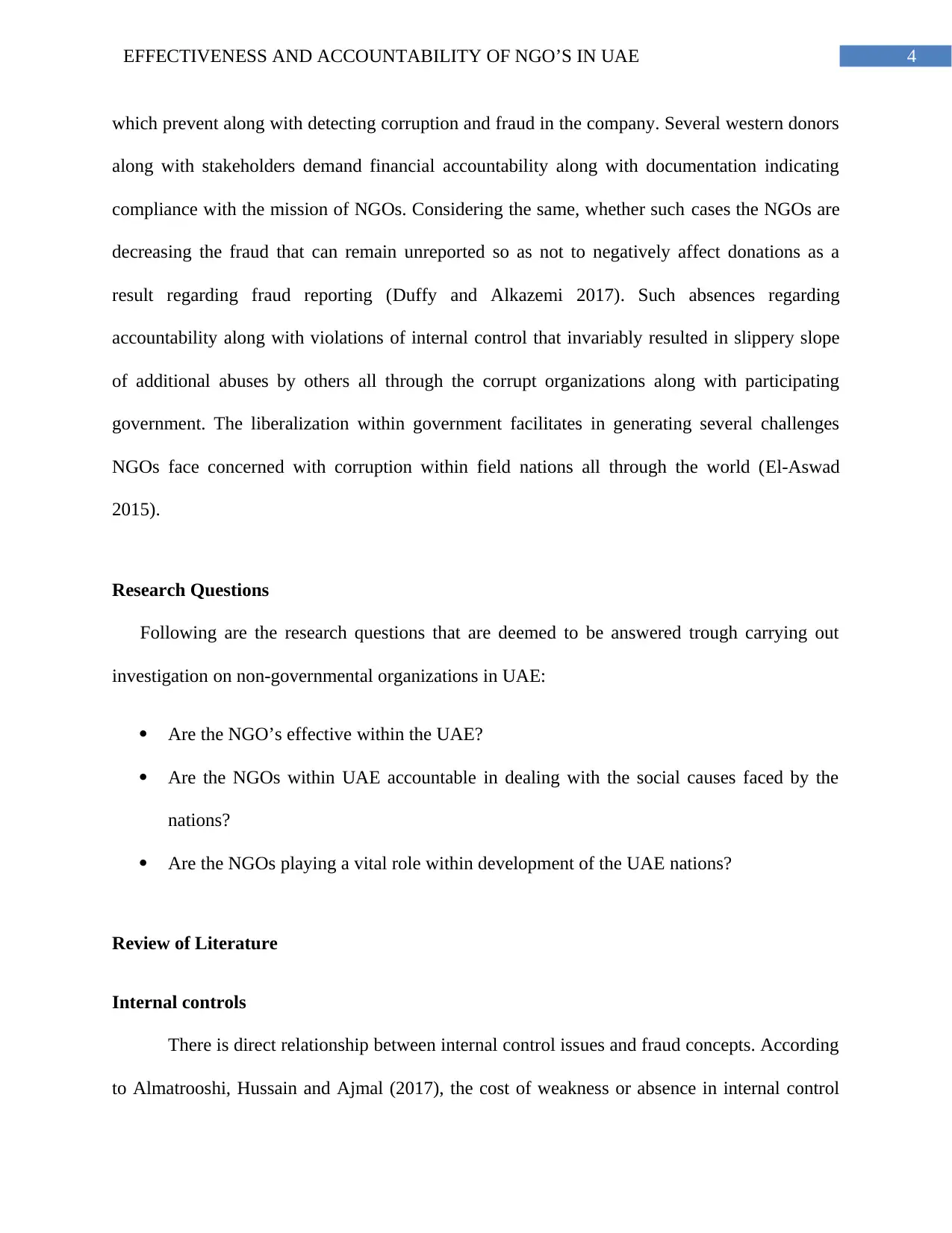
4EFFECTIVENESS AND ACCOUNTABILITY OF NGO’S IN UAE
which prevent along with detecting corruption and fraud in the company. Several western donors
along with stakeholders demand financial accountability along with documentation indicating
compliance with the mission of NGOs. Considering the same, whether such cases the NGOs are
decreasing the fraud that can remain unreported so as not to negatively affect donations as a
result regarding fraud reporting (Duffy and Alkazemi 2017). Such absences regarding
accountability along with violations of internal control that invariably resulted in slippery slope
of additional abuses by others all through the corrupt organizations along with participating
government. The liberalization within government facilitates in generating several challenges
NGOs face concerned with corruption within field nations all through the world (El-Aswad
2015).
Research Questions
Following are the research questions that are deemed to be answered trough carrying out
investigation on non-governmental organizations in UAE:
Are the NGO’s effective within the UAE?
Are the NGOs within UAE accountable in dealing with the social causes faced by the
nations?
Are the NGOs playing a vital role within development of the UAE nations?
Review of Literature
Internal controls
There is direct relationship between internal control issues and fraud concepts. According
to Almatrooshi, Hussain and Ajmal (2017), the cost of weakness or absence in internal control
which prevent along with detecting corruption and fraud in the company. Several western donors
along with stakeholders demand financial accountability along with documentation indicating
compliance with the mission of NGOs. Considering the same, whether such cases the NGOs are
decreasing the fraud that can remain unreported so as not to negatively affect donations as a
result regarding fraud reporting (Duffy and Alkazemi 2017). Such absences regarding
accountability along with violations of internal control that invariably resulted in slippery slope
of additional abuses by others all through the corrupt organizations along with participating
government. The liberalization within government facilitates in generating several challenges
NGOs face concerned with corruption within field nations all through the world (El-Aswad
2015).
Research Questions
Following are the research questions that are deemed to be answered trough carrying out
investigation on non-governmental organizations in UAE:
Are the NGO’s effective within the UAE?
Are the NGOs within UAE accountable in dealing with the social causes faced by the
nations?
Are the NGOs playing a vital role within development of the UAE nations?
Review of Literature
Internal controls
There is direct relationship between internal control issues and fraud concepts. According
to Almatrooshi, Hussain and Ajmal (2017), the cost of weakness or absence in internal control
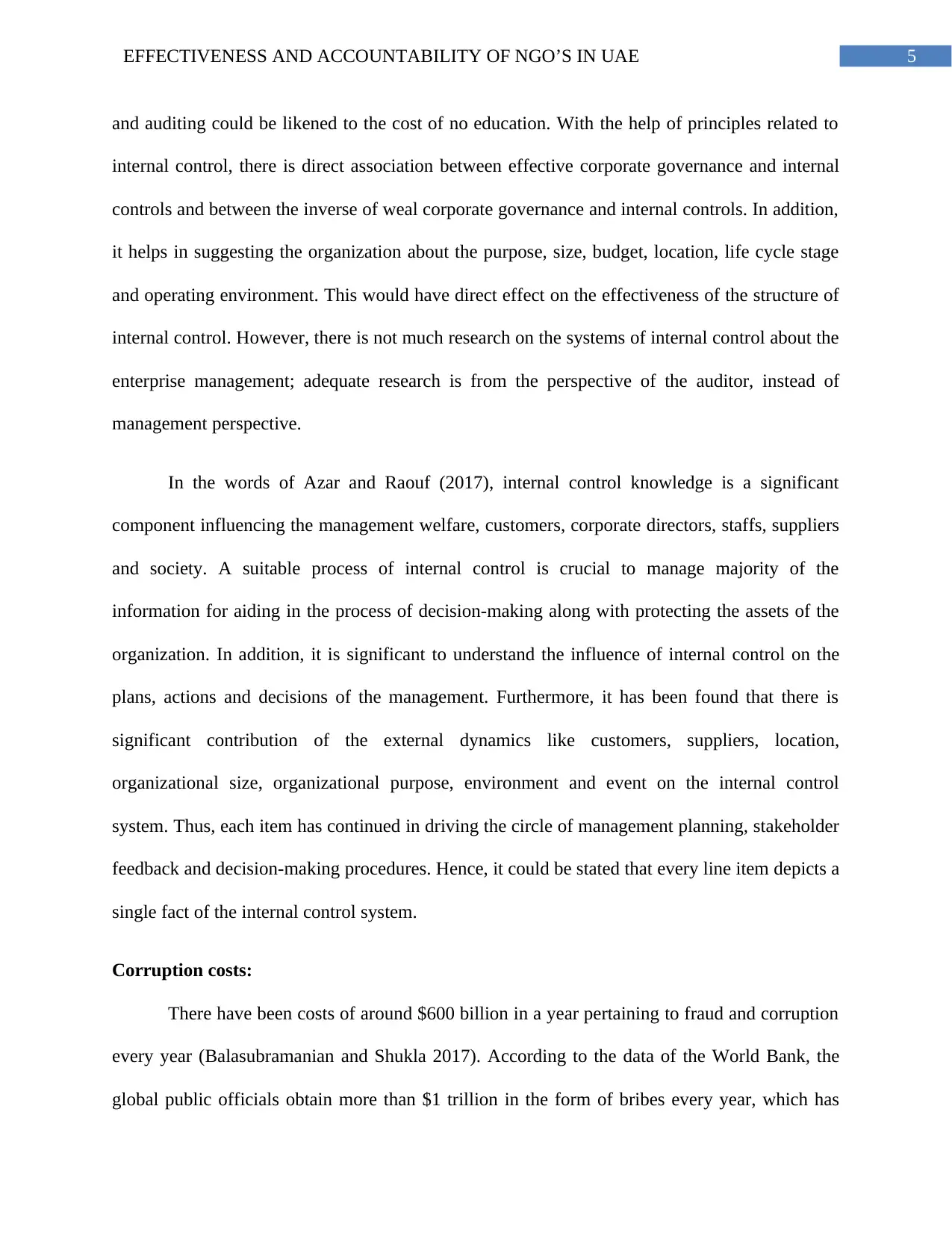
5EFFECTIVENESS AND ACCOUNTABILITY OF NGO’S IN UAE
and auditing could be likened to the cost of no education. With the help of principles related to
internal control, there is direct association between effective corporate governance and internal
controls and between the inverse of weal corporate governance and internal controls. In addition,
it helps in suggesting the organization about the purpose, size, budget, location, life cycle stage
and operating environment. This would have direct effect on the effectiveness of the structure of
internal control. However, there is not much research on the systems of internal control about the
enterprise management; adequate research is from the perspective of the auditor, instead of
management perspective.
In the words of Azar and Raouf (2017), internal control knowledge is a significant
component influencing the management welfare, customers, corporate directors, staffs, suppliers
and society. A suitable process of internal control is crucial to manage majority of the
information for aiding in the process of decision-making along with protecting the assets of the
organization. In addition, it is significant to understand the influence of internal control on the
plans, actions and decisions of the management. Furthermore, it has been found that there is
significant contribution of the external dynamics like customers, suppliers, location,
organizational size, organizational purpose, environment and event on the internal control
system. Thus, each item has continued in driving the circle of management planning, stakeholder
feedback and decision-making procedures. Hence, it could be stated that every line item depicts a
single fact of the internal control system.
Corruption costs:
There have been costs of around $600 billion in a year pertaining to fraud and corruption
every year (Balasubramanian and Shukla 2017). According to the data of the World Bank, the
global public officials obtain more than $1 trillion in the form of bribes every year, which has
and auditing could be likened to the cost of no education. With the help of principles related to
internal control, there is direct association between effective corporate governance and internal
controls and between the inverse of weal corporate governance and internal controls. In addition,
it helps in suggesting the organization about the purpose, size, budget, location, life cycle stage
and operating environment. This would have direct effect on the effectiveness of the structure of
internal control. However, there is not much research on the systems of internal control about the
enterprise management; adequate research is from the perspective of the auditor, instead of
management perspective.
In the words of Azar and Raouf (2017), internal control knowledge is a significant
component influencing the management welfare, customers, corporate directors, staffs, suppliers
and society. A suitable process of internal control is crucial to manage majority of the
information for aiding in the process of decision-making along with protecting the assets of the
organization. In addition, it is significant to understand the influence of internal control on the
plans, actions and decisions of the management. Furthermore, it has been found that there is
significant contribution of the external dynamics like customers, suppliers, location,
organizational size, organizational purpose, environment and event on the internal control
system. Thus, each item has continued in driving the circle of management planning, stakeholder
feedback and decision-making procedures. Hence, it could be stated that every line item depicts a
single fact of the internal control system.
Corruption costs:
There have been costs of around $600 billion in a year pertaining to fraud and corruption
every year (Balasubramanian and Shukla 2017). According to the data of the World Bank, the
global public officials obtain more than $1 trillion in the form of bribes every year, which has
⊘ This is a preview!⊘
Do you want full access?
Subscribe today to unlock all pages.

Trusted by 1+ million students worldwide
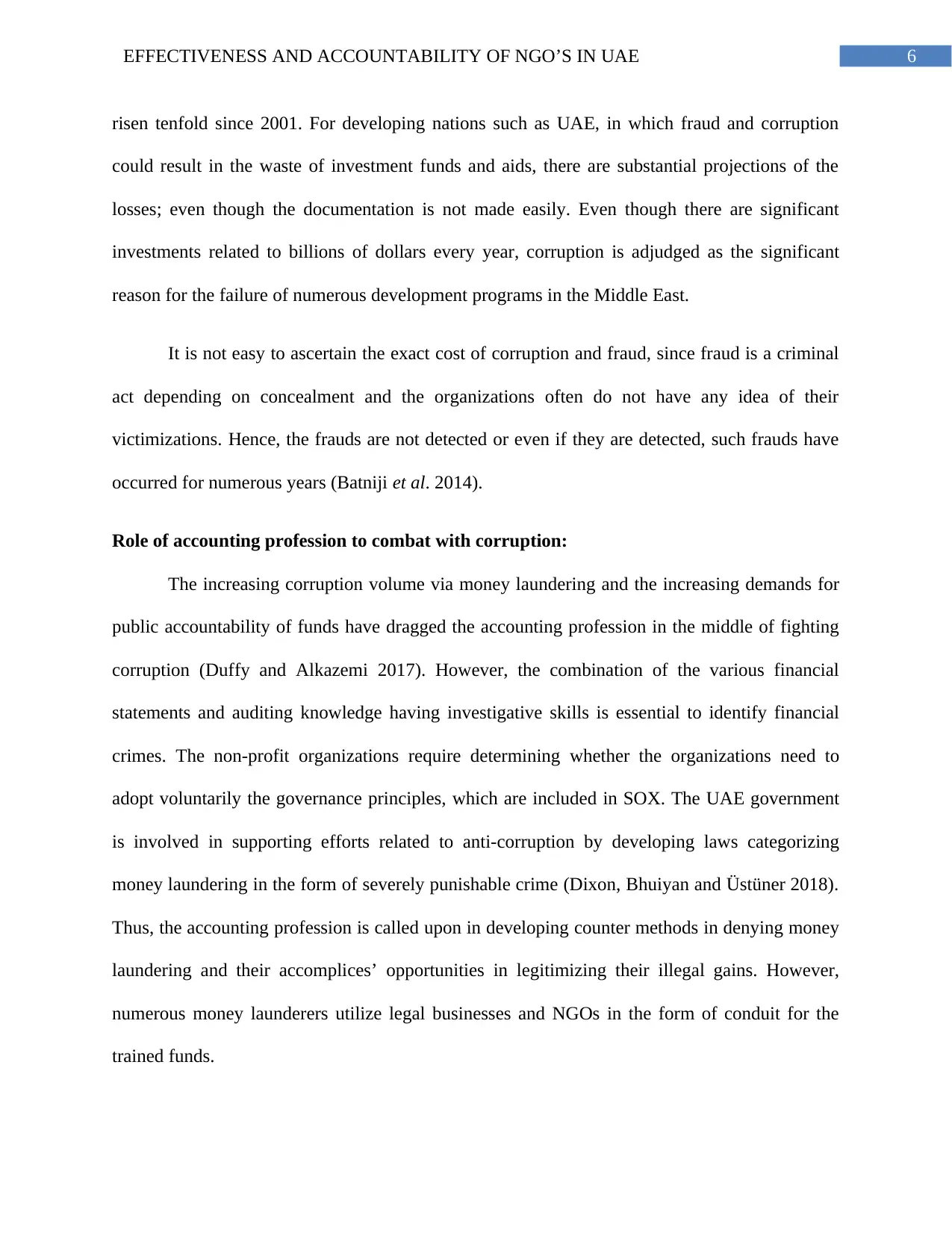
6EFFECTIVENESS AND ACCOUNTABILITY OF NGO’S IN UAE
risen tenfold since 2001. For developing nations such as UAE, in which fraud and corruption
could result in the waste of investment funds and aids, there are substantial projections of the
losses; even though the documentation is not made easily. Even though there are significant
investments related to billions of dollars every year, corruption is adjudged as the significant
reason for the failure of numerous development programs in the Middle East.
It is not easy to ascertain the exact cost of corruption and fraud, since fraud is a criminal
act depending on concealment and the organizations often do not have any idea of their
victimizations. Hence, the frauds are not detected or even if they are detected, such frauds have
occurred for numerous years (Batniji et al. 2014).
Role of accounting profession to combat with corruption:
The increasing corruption volume via money laundering and the increasing demands for
public accountability of funds have dragged the accounting profession in the middle of fighting
corruption (Duffy and Alkazemi 2017). However, the combination of the various financial
statements and auditing knowledge having investigative skills is essential to identify financial
crimes. The non-profit organizations require determining whether the organizations need to
adopt voluntarily the governance principles, which are included in SOX. The UAE government
is involved in supporting efforts related to anti-corruption by developing laws categorizing
money laundering in the form of severely punishable crime (Dixon, Bhuiyan and Üstüner 2018).
Thus, the accounting profession is called upon in developing counter methods in denying money
laundering and their accomplices’ opportunities in legitimizing their illegal gains. However,
numerous money launderers utilize legal businesses and NGOs in the form of conduit for the
trained funds.
risen tenfold since 2001. For developing nations such as UAE, in which fraud and corruption
could result in the waste of investment funds and aids, there are substantial projections of the
losses; even though the documentation is not made easily. Even though there are significant
investments related to billions of dollars every year, corruption is adjudged as the significant
reason for the failure of numerous development programs in the Middle East.
It is not easy to ascertain the exact cost of corruption and fraud, since fraud is a criminal
act depending on concealment and the organizations often do not have any idea of their
victimizations. Hence, the frauds are not detected or even if they are detected, such frauds have
occurred for numerous years (Batniji et al. 2014).
Role of accounting profession to combat with corruption:
The increasing corruption volume via money laundering and the increasing demands for
public accountability of funds have dragged the accounting profession in the middle of fighting
corruption (Duffy and Alkazemi 2017). However, the combination of the various financial
statements and auditing knowledge having investigative skills is essential to identify financial
crimes. The non-profit organizations require determining whether the organizations need to
adopt voluntarily the governance principles, which are included in SOX. The UAE government
is involved in supporting efforts related to anti-corruption by developing laws categorizing
money laundering in the form of severely punishable crime (Dixon, Bhuiyan and Üstüner 2018).
Thus, the accounting profession is called upon in developing counter methods in denying money
laundering and their accomplices’ opportunities in legitimizing their illegal gains. However,
numerous money launderers utilize legal businesses and NGOs in the form of conduit for the
trained funds.
Paraphrase This Document
Need a fresh take? Get an instant paraphrase of this document with our AI Paraphraser
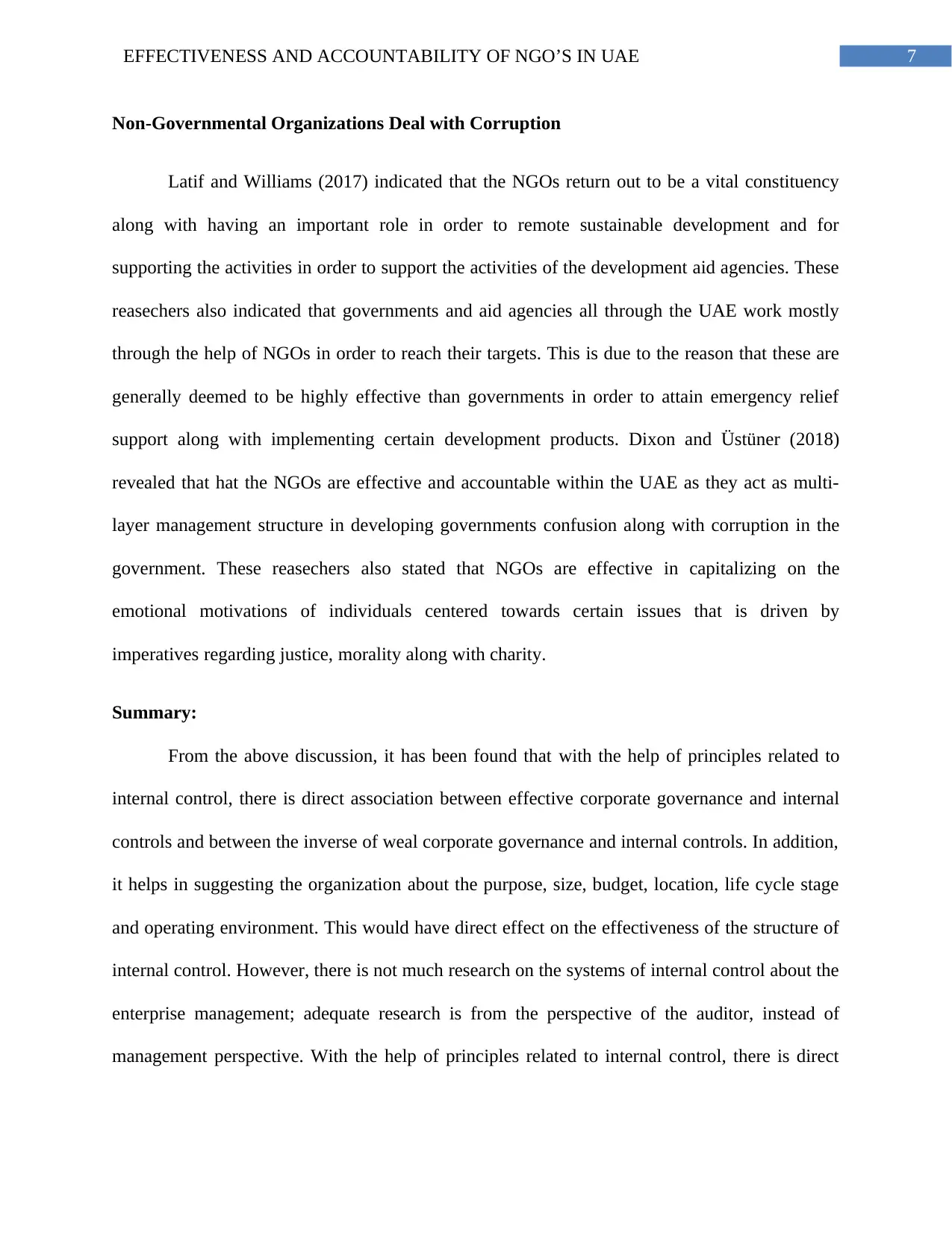
7EFFECTIVENESS AND ACCOUNTABILITY OF NGO’S IN UAE
Non-Governmental Organizations Deal with Corruption
Latif and Williams (2017) indicated that the NGOs return out to be a vital constituency
along with having an important role in order to remote sustainable development and for
supporting the activities in order to support the activities of the development aid agencies. These
reasechers also indicated that governments and aid agencies all through the UAE work mostly
through the help of NGOs in order to reach their targets. This is due to the reason that these are
generally deemed to be highly effective than governments in order to attain emergency relief
support along with implementing certain development products. Dixon and Üstüner (2018)
revealed that hat the NGOs are effective and accountable within the UAE as they act as multi-
layer management structure in developing governments confusion along with corruption in the
government. These reasechers also stated that NGOs are effective in capitalizing on the
emotional motivations of individuals centered towards certain issues that is driven by
imperatives regarding justice, morality along with charity.
Summary:
From the above discussion, it has been found that with the help of principles related to
internal control, there is direct association between effective corporate governance and internal
controls and between the inverse of weal corporate governance and internal controls. In addition,
it helps in suggesting the organization about the purpose, size, budget, location, life cycle stage
and operating environment. This would have direct effect on the effectiveness of the structure of
internal control. However, there is not much research on the systems of internal control about the
enterprise management; adequate research is from the perspective of the auditor, instead of
management perspective. With the help of principles related to internal control, there is direct
Non-Governmental Organizations Deal with Corruption
Latif and Williams (2017) indicated that the NGOs return out to be a vital constituency
along with having an important role in order to remote sustainable development and for
supporting the activities in order to support the activities of the development aid agencies. These
reasechers also indicated that governments and aid agencies all through the UAE work mostly
through the help of NGOs in order to reach their targets. This is due to the reason that these are
generally deemed to be highly effective than governments in order to attain emergency relief
support along with implementing certain development products. Dixon and Üstüner (2018)
revealed that hat the NGOs are effective and accountable within the UAE as they act as multi-
layer management structure in developing governments confusion along with corruption in the
government. These reasechers also stated that NGOs are effective in capitalizing on the
emotional motivations of individuals centered towards certain issues that is driven by
imperatives regarding justice, morality along with charity.
Summary:
From the above discussion, it has been found that with the help of principles related to
internal control, there is direct association between effective corporate governance and internal
controls and between the inverse of weal corporate governance and internal controls. In addition,
it helps in suggesting the organization about the purpose, size, budget, location, life cycle stage
and operating environment. This would have direct effect on the effectiveness of the structure of
internal control. However, there is not much research on the systems of internal control about the
enterprise management; adequate research is from the perspective of the auditor, instead of
management perspective. With the help of principles related to internal control, there is direct
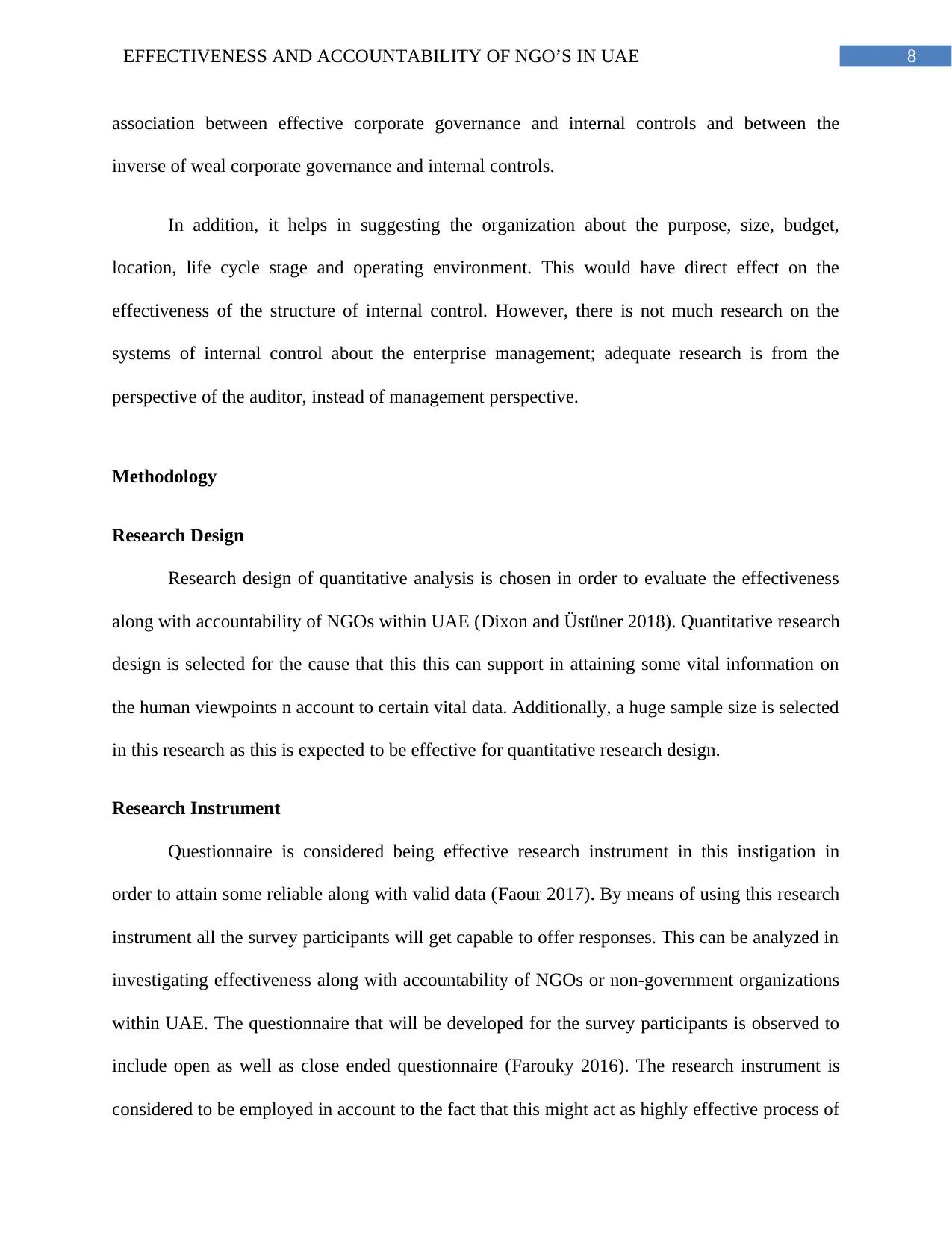
8EFFECTIVENESS AND ACCOUNTABILITY OF NGO’S IN UAE
association between effective corporate governance and internal controls and between the
inverse of weal corporate governance and internal controls.
In addition, it helps in suggesting the organization about the purpose, size, budget,
location, life cycle stage and operating environment. This would have direct effect on the
effectiveness of the structure of internal control. However, there is not much research on the
systems of internal control about the enterprise management; adequate research is from the
perspective of the auditor, instead of management perspective.
Methodology
Research Design
Research design of quantitative analysis is chosen in order to evaluate the effectiveness
along with accountability of NGOs within UAE (Dixon and Üstüner 2018). Quantitative research
design is selected for the cause that this this can support in attaining some vital information on
the human viewpoints n account to certain vital data. Additionally, a huge sample size is selected
in this research as this is expected to be effective for quantitative research design.
Research Instrument
Questionnaire is considered being effective research instrument in this instigation in
order to attain some reliable along with valid data (Faour 2017). By means of using this research
instrument all the survey participants will get capable to offer responses. This can be analyzed in
investigating effectiveness along with accountability of NGOs or non-government organizations
within UAE. The questionnaire that will be developed for the survey participants is observed to
include open as well as close ended questionnaire (Farouky 2016). The research instrument is
considered to be employed in account to the fact that this might act as highly effective process of
association between effective corporate governance and internal controls and between the
inverse of weal corporate governance and internal controls.
In addition, it helps in suggesting the organization about the purpose, size, budget,
location, life cycle stage and operating environment. This would have direct effect on the
effectiveness of the structure of internal control. However, there is not much research on the
systems of internal control about the enterprise management; adequate research is from the
perspective of the auditor, instead of management perspective.
Methodology
Research Design
Research design of quantitative analysis is chosen in order to evaluate the effectiveness
along with accountability of NGOs within UAE (Dixon and Üstüner 2018). Quantitative research
design is selected for the cause that this this can support in attaining some vital information on
the human viewpoints n account to certain vital data. Additionally, a huge sample size is selected
in this research as this is expected to be effective for quantitative research design.
Research Instrument
Questionnaire is considered being effective research instrument in this instigation in
order to attain some reliable along with valid data (Faour 2017). By means of using this research
instrument all the survey participants will get capable to offer responses. This can be analyzed in
investigating effectiveness along with accountability of NGOs or non-government organizations
within UAE. The questionnaire that will be developed for the survey participants is observed to
include open as well as close ended questionnaire (Farouky 2016). The research instrument is
considered to be employed in account to the fact that this might act as highly effective process of
⊘ This is a preview!⊘
Do you want full access?
Subscribe today to unlock all pages.

Trusted by 1+ million students worldwide
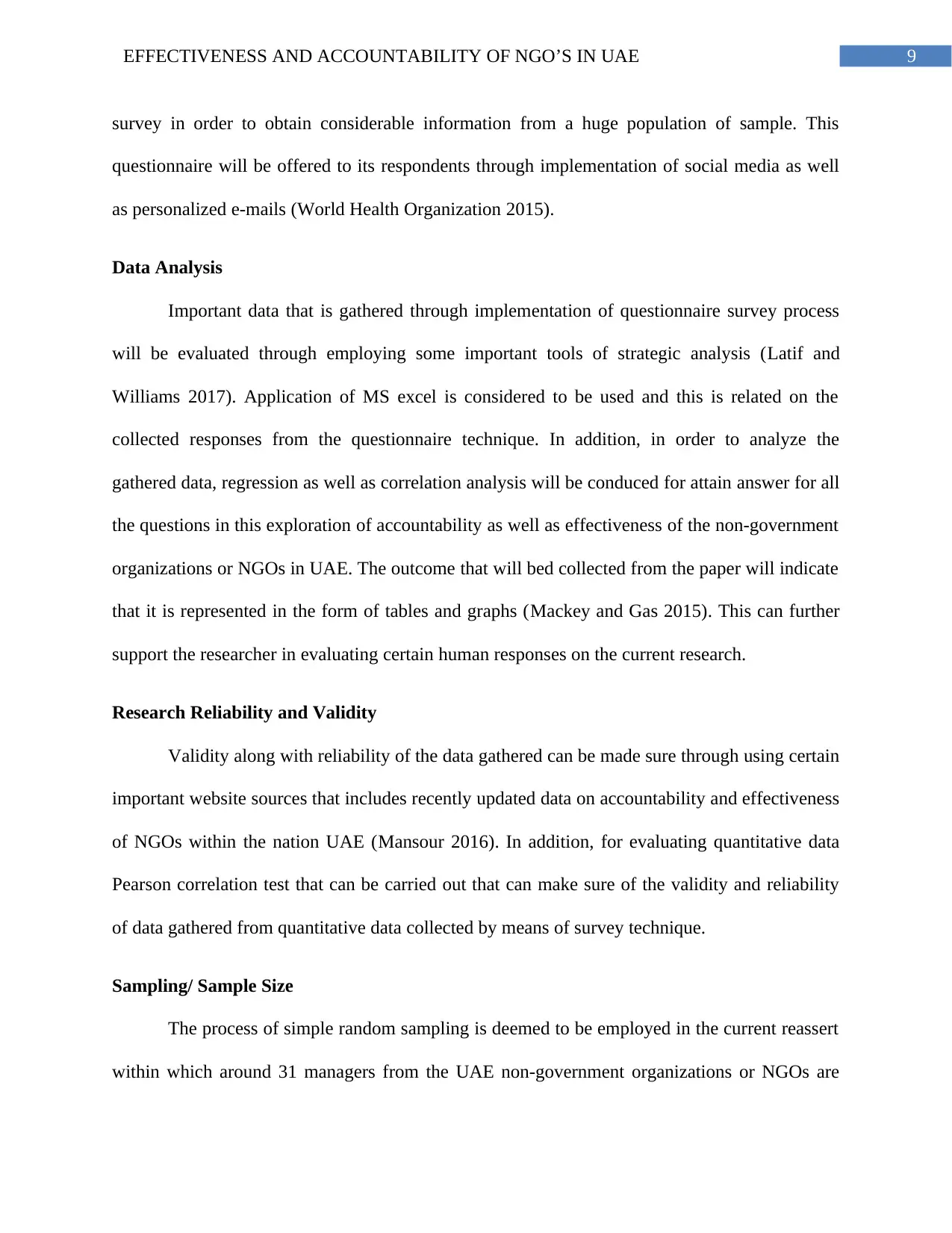
9EFFECTIVENESS AND ACCOUNTABILITY OF NGO’S IN UAE
survey in order to obtain considerable information from a huge population of sample. This
questionnaire will be offered to its respondents through implementation of social media as well
as personalized e-mails (World Health Organization 2015).
Data Analysis
Important data that is gathered through implementation of questionnaire survey process
will be evaluated through employing some important tools of strategic analysis (Latif and
Williams 2017). Application of MS excel is considered to be used and this is related on the
collected responses from the questionnaire technique. In addition, in order to analyze the
gathered data, regression as well as correlation analysis will be conduced for attain answer for all
the questions in this exploration of accountability as well as effectiveness of the non-government
organizations or NGOs in UAE. The outcome that will bed collected from the paper will indicate
that it is represented in the form of tables and graphs (Mackey and Gas 2015). This can further
support the researcher in evaluating certain human responses on the current research.
Research Reliability and Validity
Validity along with reliability of the data gathered can be made sure through using certain
important website sources that includes recently updated data on accountability and effectiveness
of NGOs within the nation UAE (Mansour 2016). In addition, for evaluating quantitative data
Pearson correlation test that can be carried out that can make sure of the validity and reliability
of data gathered from quantitative data collected by means of survey technique.
Sampling/ Sample Size
The process of simple random sampling is deemed to be employed in the current reassert
within which around 31 managers from the UAE non-government organizations or NGOs are
survey in order to obtain considerable information from a huge population of sample. This
questionnaire will be offered to its respondents through implementation of social media as well
as personalized e-mails (World Health Organization 2015).
Data Analysis
Important data that is gathered through implementation of questionnaire survey process
will be evaluated through employing some important tools of strategic analysis (Latif and
Williams 2017). Application of MS excel is considered to be used and this is related on the
collected responses from the questionnaire technique. In addition, in order to analyze the
gathered data, regression as well as correlation analysis will be conduced for attain answer for all
the questions in this exploration of accountability as well as effectiveness of the non-government
organizations or NGOs in UAE. The outcome that will bed collected from the paper will indicate
that it is represented in the form of tables and graphs (Mackey and Gas 2015). This can further
support the researcher in evaluating certain human responses on the current research.
Research Reliability and Validity
Validity along with reliability of the data gathered can be made sure through using certain
important website sources that includes recently updated data on accountability and effectiveness
of NGOs within the nation UAE (Mansour 2016). In addition, for evaluating quantitative data
Pearson correlation test that can be carried out that can make sure of the validity and reliability
of data gathered from quantitative data collected by means of survey technique.
Sampling/ Sample Size
The process of simple random sampling is deemed to be employed in the current reassert
within which around 31 managers from the UAE non-government organizations or NGOs are
Paraphrase This Document
Need a fresh take? Get an instant paraphrase of this document with our AI Paraphraser
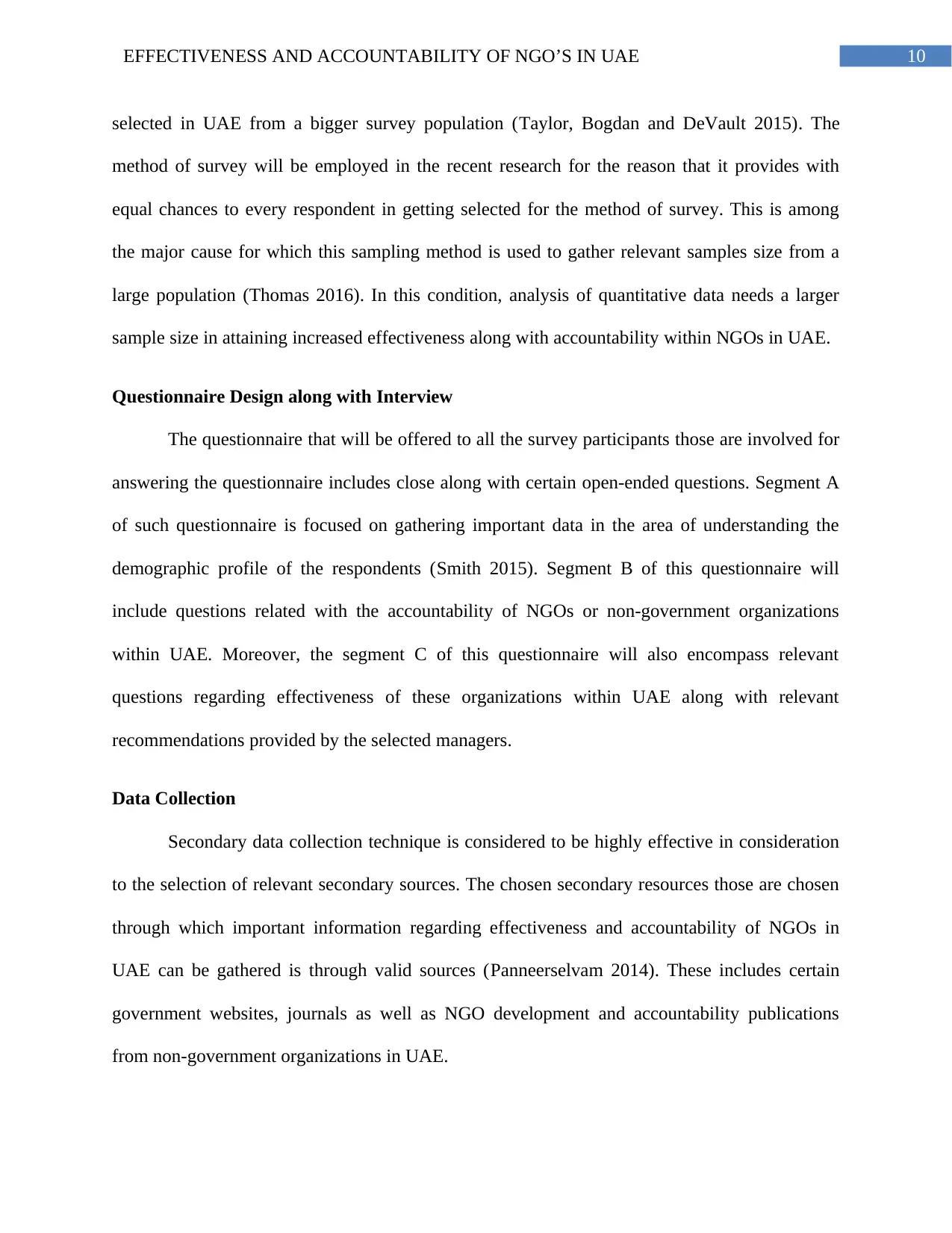
10EFFECTIVENESS AND ACCOUNTABILITY OF NGO’S IN UAE
selected in UAE from a bigger survey population (Taylor, Bogdan and DeVault 2015). The
method of survey will be employed in the recent research for the reason that it provides with
equal chances to every respondent in getting selected for the method of survey. This is among
the major cause for which this sampling method is used to gather relevant samples size from a
large population (Thomas 2016). In this condition, analysis of quantitative data needs a larger
sample size in attaining increased effectiveness along with accountability within NGOs in UAE.
Questionnaire Design along with Interview
The questionnaire that will be offered to all the survey participants those are involved for
answering the questionnaire includes close along with certain open-ended questions. Segment A
of such questionnaire is focused on gathering important data in the area of understanding the
demographic profile of the respondents (Smith 2015). Segment B of this questionnaire will
include questions related with the accountability of NGOs or non-government organizations
within UAE. Moreover, the segment C of this questionnaire will also encompass relevant
questions regarding effectiveness of these organizations within UAE along with relevant
recommendations provided by the selected managers.
Data Collection
Secondary data collection technique is considered to be highly effective in consideration
to the selection of relevant secondary sources. The chosen secondary resources those are chosen
through which important information regarding effectiveness and accountability of NGOs in
UAE can be gathered is through valid sources (Panneerselvam 2014). These includes certain
government websites, journals as well as NGO development and accountability publications
from non-government organizations in UAE.
selected in UAE from a bigger survey population (Taylor, Bogdan and DeVault 2015). The
method of survey will be employed in the recent research for the reason that it provides with
equal chances to every respondent in getting selected for the method of survey. This is among
the major cause for which this sampling method is used to gather relevant samples size from a
large population (Thomas 2016). In this condition, analysis of quantitative data needs a larger
sample size in attaining increased effectiveness along with accountability within NGOs in UAE.
Questionnaire Design along with Interview
The questionnaire that will be offered to all the survey participants those are involved for
answering the questionnaire includes close along with certain open-ended questions. Segment A
of such questionnaire is focused on gathering important data in the area of understanding the
demographic profile of the respondents (Smith 2015). Segment B of this questionnaire will
include questions related with the accountability of NGOs or non-government organizations
within UAE. Moreover, the segment C of this questionnaire will also encompass relevant
questions regarding effectiveness of these organizations within UAE along with relevant
recommendations provided by the selected managers.
Data Collection
Secondary data collection technique is considered to be highly effective in consideration
to the selection of relevant secondary sources. The chosen secondary resources those are chosen
through which important information regarding effectiveness and accountability of NGOs in
UAE can be gathered is through valid sources (Panneerselvam 2014). These includes certain
government websites, journals as well as NGO development and accountability publications
from non-government organizations in UAE.
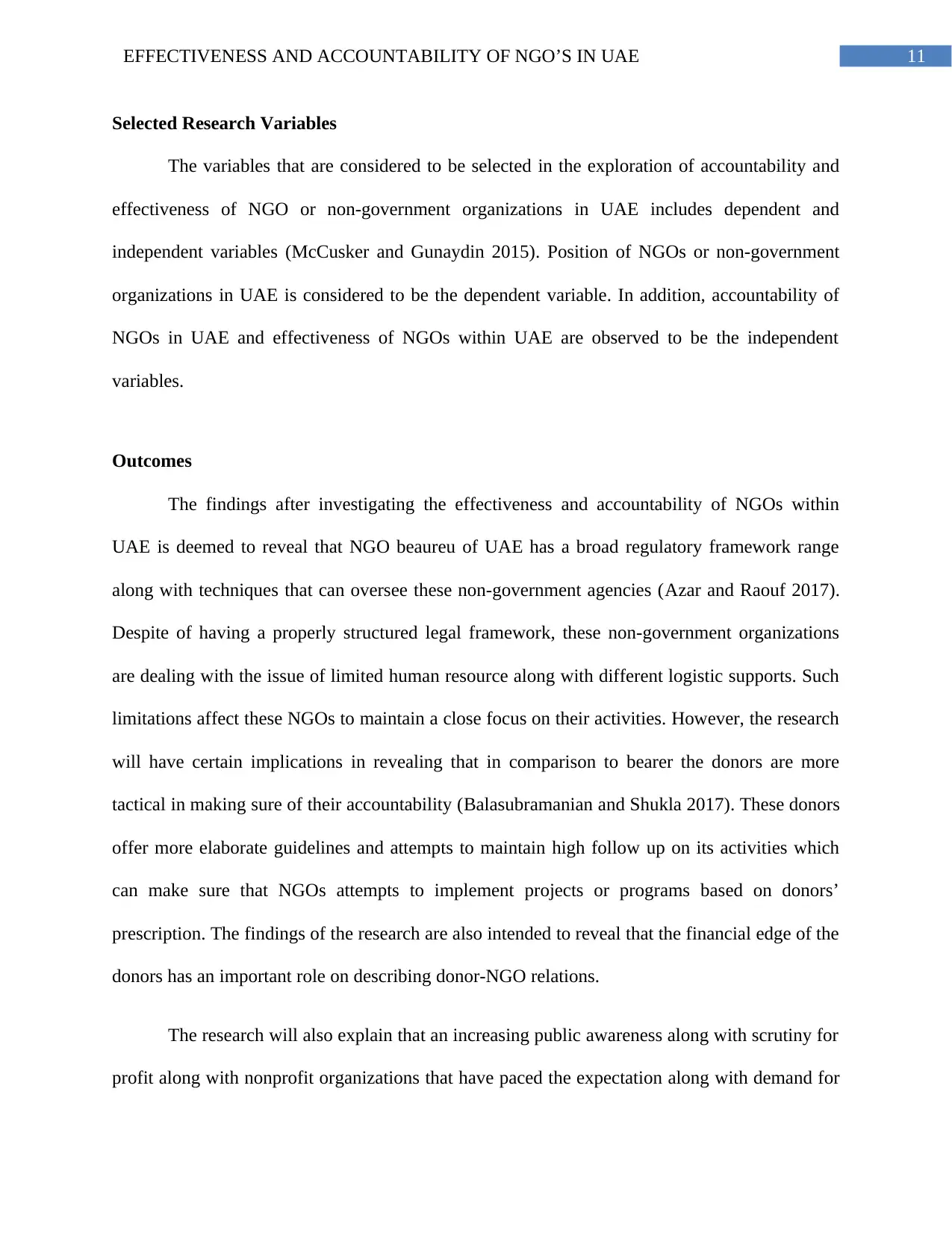
11EFFECTIVENESS AND ACCOUNTABILITY OF NGO’S IN UAE
Selected Research Variables
The variables that are considered to be selected in the exploration of accountability and
effectiveness of NGO or non-government organizations in UAE includes dependent and
independent variables (McCusker and Gunaydin 2015). Position of NGOs or non-government
organizations in UAE is considered to be the dependent variable. In addition, accountability of
NGOs in UAE and effectiveness of NGOs within UAE are observed to be the independent
variables.
Outcomes
The findings after investigating the effectiveness and accountability of NGOs within
UAE is deemed to reveal that NGO beaureu of UAE has a broad regulatory framework range
along with techniques that can oversee these non-government agencies (Azar and Raouf 2017).
Despite of having a properly structured legal framework, these non-government organizations
are dealing with the issue of limited human resource along with different logistic supports. Such
limitations affect these NGOs to maintain a close focus on their activities. However, the research
will have certain implications in revealing that in comparison to bearer the donors are more
tactical in making sure of their accountability (Balasubramanian and Shukla 2017). These donors
offer more elaborate guidelines and attempts to maintain high follow up on its activities which
can make sure that NGOs attempts to implement projects or programs based on donors’
prescription. The findings of the research are also intended to reveal that the financial edge of the
donors has an important role on describing donor-NGO relations.
The research will also explain that an increasing public awareness along with scrutiny for
profit along with nonprofit organizations that have paced the expectation along with demand for
Selected Research Variables
The variables that are considered to be selected in the exploration of accountability and
effectiveness of NGO or non-government organizations in UAE includes dependent and
independent variables (McCusker and Gunaydin 2015). Position of NGOs or non-government
organizations in UAE is considered to be the dependent variable. In addition, accountability of
NGOs in UAE and effectiveness of NGOs within UAE are observed to be the independent
variables.
Outcomes
The findings after investigating the effectiveness and accountability of NGOs within
UAE is deemed to reveal that NGO beaureu of UAE has a broad regulatory framework range
along with techniques that can oversee these non-government agencies (Azar and Raouf 2017).
Despite of having a properly structured legal framework, these non-government organizations
are dealing with the issue of limited human resource along with different logistic supports. Such
limitations affect these NGOs to maintain a close focus on their activities. However, the research
will have certain implications in revealing that in comparison to bearer the donors are more
tactical in making sure of their accountability (Balasubramanian and Shukla 2017). These donors
offer more elaborate guidelines and attempts to maintain high follow up on its activities which
can make sure that NGOs attempts to implement projects or programs based on donors’
prescription. The findings of the research are also intended to reveal that the financial edge of the
donors has an important role on describing donor-NGO relations.
The research will also explain that an increasing public awareness along with scrutiny for
profit along with nonprofit organizations that have paced the expectation along with demand for
⊘ This is a preview!⊘
Do you want full access?
Subscribe today to unlock all pages.

Trusted by 1+ million students worldwide
1 out of 17
Related Documents
Your All-in-One AI-Powered Toolkit for Academic Success.
+13062052269
info@desklib.com
Available 24*7 on WhatsApp / Email
![[object Object]](/_next/static/media/star-bottom.7253800d.svg)
Unlock your academic potential
Copyright © 2020–2026 A2Z Services. All Rights Reserved. Developed and managed by ZUCOL.





